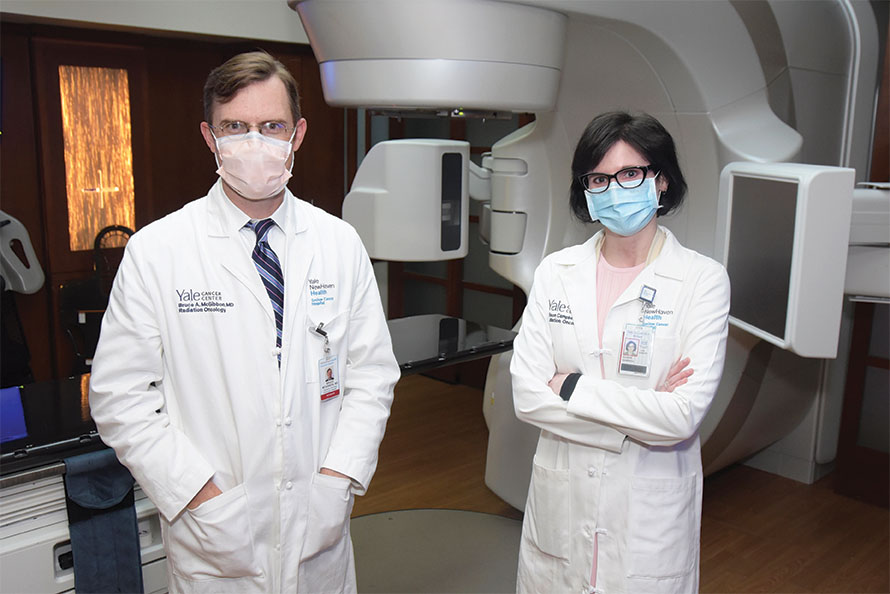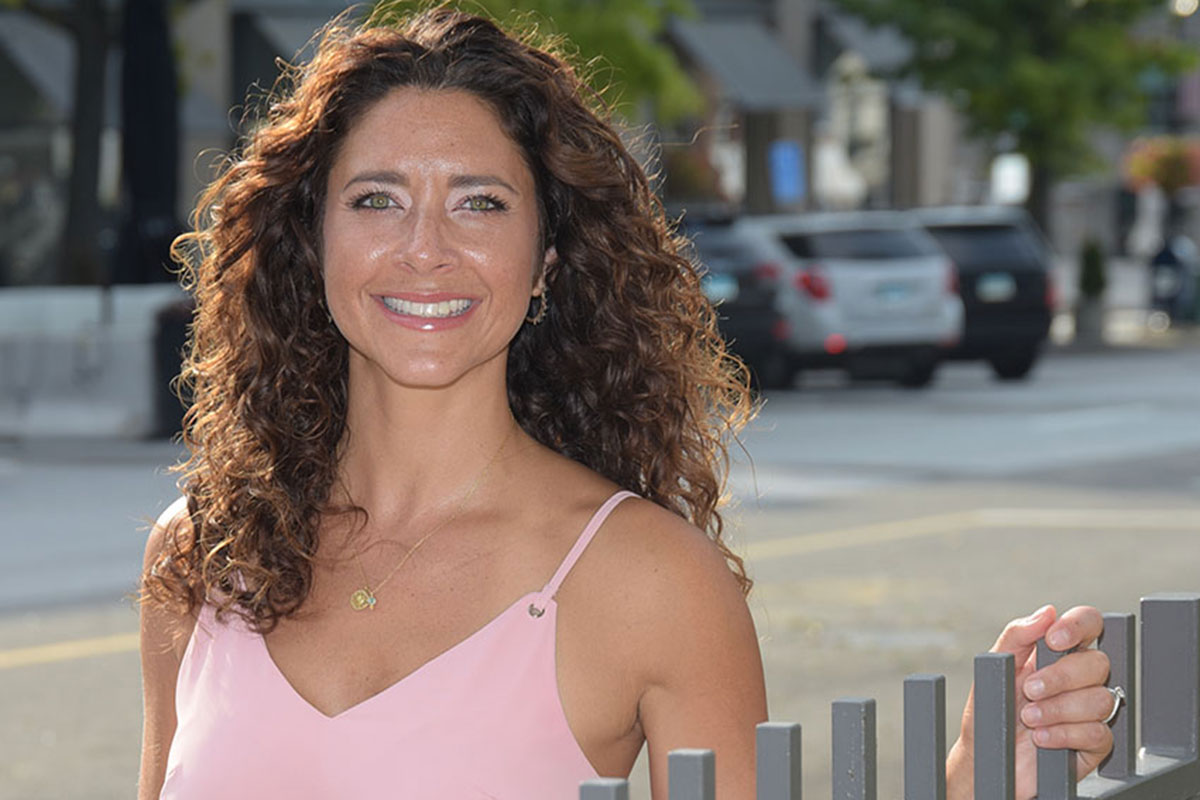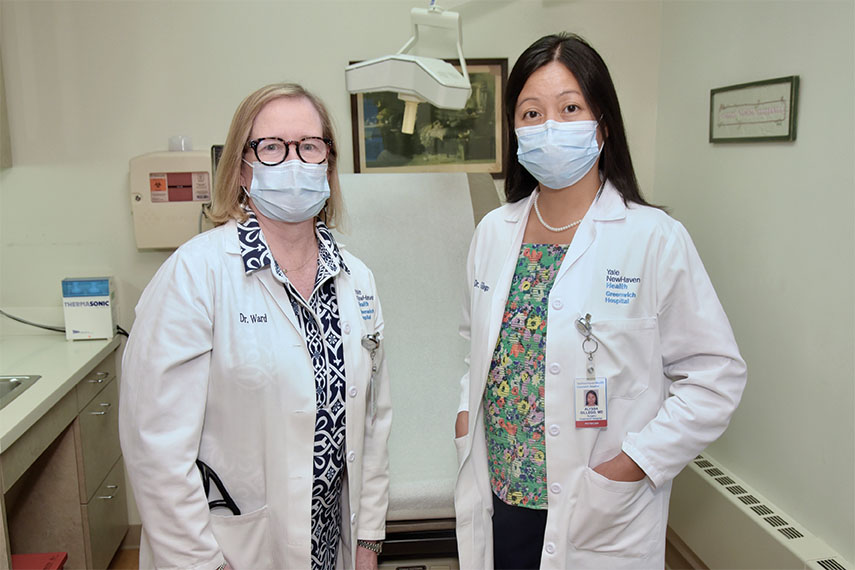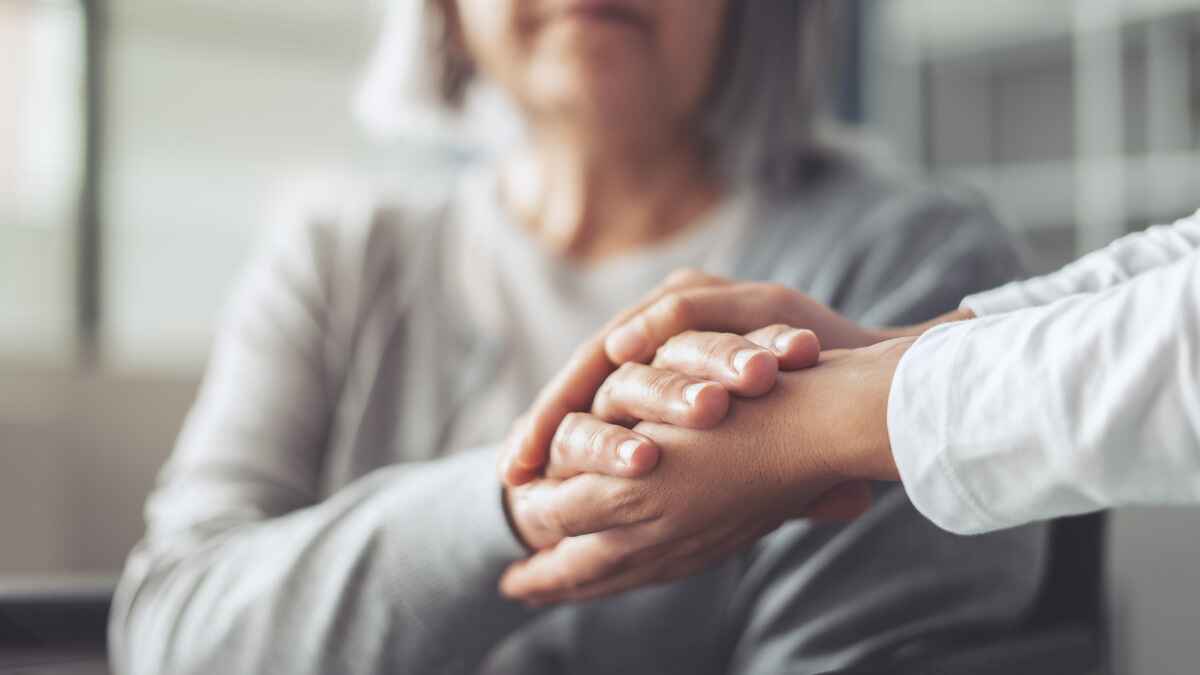March 2020 was a challenging time for Greenwich resident Elyse Merolla and her family. COVID-19 had just hit Connecticut. Suddenly, schools were closed, and her husband’s barbershop shut down. “Then I felt a lump in my right armpit,” said Merolla, an intensive care nurse who was taking time off to raise her three children, then ages 6, 4 and 18 months. “I thought it was just an infection, but I knew enough to call my primary care doctor.”
On March 17, the doctor discovered a lump in her right breast. Within hours, Merolla was at the Breast Center at Smilow Cancer Hospital Care Center in Greenwich undergoing a blood test, mammogram and ultrasound, which detected a tumor. She immediately met with Alyssa Gillego, MD, a breast surgical oncologist. “She told me I had breast cancer,” Merolla said, remembering Dr. Gillego’s calm, soft-spoken manner. “I was 35, ate well, exercised, practiced yoga. So in my mind, I couldn’t have cancer.” A biopsy the next day confirmed she had stage 3 HER2- positive invasive breast cancer, an aggressive type of cancer that grows and spreads quickly.
Fast-forward 18 months to September 2021. Merolla celebrated a cancer-free 37th birthday with her family after successfully undergoing radiation therapy treatments, chemotherapy, a double mastectomy and reconstructive surgery. She’s happy the two older children are back in school and her husband is cutting hair again. She’s a cancer survivor who uses words such as “amazing,” “fantastic,” “awesome,” “blessed” and “everybody was so caring and wonderful” to express her gratitude for the months of care at Greenwich Hospital.
Merolla is among the thousands of area residents who rely on the comprehensive care provided by the Breast Center, which has received the Women’s Choice Award as one of America’s Best Breast Centers for seven consecutive years. “Women choose Greenwich Hospital because we offer the highest level of care in a supportive and compassionate setting,” said Barbara Ward, MD, Breast Center medical director.
The Breast Center offers a full range of advanced screening, diagnostic procedures and treatment options locally, in a state with one of the country’s highest incidence of breast cancer, according to the American Cancer Society. Fortunately, more women are surviving breast cancer than ever before, thanks to cutting-edge, personalized care.
“We have access to the entire Smilow network, from people resources to material needs,” said M. Sung Lee, MD, a Yale Medicine medical oncologist and director of the Smilow Cancer Hospital Care Center in Greenwich, referring to Greenwich Hospital’s affiliation with Smilow Cancer Hospital in New Haven, Yale Cancer Center and Yale Medicine physicians. “Having access to the best range of oncology treatments and the expert knowledge of my Yale colleagues is a tremendous advantage for patient care and outcomes.”
A targeted approach
Merolla’s medical journey involved a team of providers from the very first day of her ordeal and the rapid succession of screening tests, all the way through radiation therapy and surgery to her final chemotherapy session. HER2-positive refers to cancers that test positive for the protein human epidermal growth factor receptor 2. Fortunately, scientists have developed treatments that specifically target this receptor.
Just three weeks after her diagnosis, Merolla began a nearly four-month regimen of combination chemotherapy and HER2 therapy under the supervision of Barry Boyd, MD, a medical oncologist who also specializes in nutrition, exercise and weight management. He offered advice on handling nausea, loss of taste, anxiety and insomnia. “Dr. Boyd helped me stay physically and mentally intact,” she said.
Merolla worried about losing her hair during chemotherapy, “not for myself, but so the kids would see I looked okay after every session,” she said. As someone who was always willing to consider different care options, Merolla wore a cooling cap on her scalp during chemotherapy sessions. Developed by Paxman, the device cools the scalp, which reduces blood flow to the area of the hair follicles to minimize hair loss. “I also put on makeup every morning to make myself feel normal,” Merolla said.
Surgical team
A team of surgeons worked together to provide Merolla with the best possible outcome. Dr. Gillego performed a double mastectomy, removing both breasts and the lymph nodes in the right axilla, and plastic surgeon Heather Erhard, MD, replaced the breasts with implants. Merolla has since had two follow-up surgeries, with one more scheduled.
During the mastectomy, Dr. Gillego employed an innovative surgical technique that preserved Merolla’s nipples, which, along with Dr. Erhard’s reconstruction procedure, ensured the implants looked natural and symmetrical. “I still want to go to the beach,” Merolla said.
During the surgery, Andreas Lamelas, MD, a microvascular surgeon, performed a specialized procedure to reduce the risk of developing lymphedema, an abnormal swelling that can occur in the limbs when the lymph nodes are removed to check for cancer. In some cases, the lymph vessels can no longer carry all the fluid away, leading to a buildup beneath the skin. “Early studies show a decreased risk of developing lymphedema in such patients,” he said. Merolla reported no telltale signs of swelling in her arms since the surgery and is measured regularly through the lymphedema surveillance program using advanced technology called the LDEX.

The third step in Merolla’s treatment journey brought her to the Smilow Cancer Hospital Care Center’s radiation oncology department, which includes radiation oncologists, radiation therapists, medical physicists, dosimetrists, nurses and a social worker, all of whom work closely with medical oncologists, surgeons and others. “Our tight-knit group exemplifies patient-centered care,” said Bruce McGibbon, MD, the department’s medical director. “Patients like Elyse come here to see doctors and nurses who are not only highly trained but also trusted in the community.”
Breast cancer patients have access to the latest advances in radiation treatment, including prone positioning, which takes advantage of gravity to create a separation between the breast and sensitive tissues such as the heart and lungs. Another new technique is called “deep inspiration breath hold,” or DIBH, in which the patient lies on her back and uses a breathing technique (with special monitoring) to minimize exposure to the heart, especially when treating the left breast. Because Merolla received radiation on her right breast, she was placed in the traditional supine position, on her back.
A common challenge in radiation treatment is a skin reaction that appears like a sunburn, which Merolla experienced. “We treated her with over-the-counter creams, cool packs and gel pads,” Dr. McGibbon said. “She showed nice recovery and is now completely finished with her radiation.”
A bright future
Smilow’s Survivorship program helps with the recovery. “Survivorship begins at the time of diagnosis. We saw Elyse before her medical treatment started, to assess how it might impact her function in day-to-day life and provide resources to help alleviate side effects during or after treatment,” said Heather Studwell, Oncology Survivorship coordinator and an occupational therapist. “For example, we knew she was going to have her lymph nodes removed, so she was evaluated by an occupational therapist before surgery and enrolled in the lymphedema surveillance program. The same therapist worked with Elyse after her initial surgery to lessen the side effects that can come after surgery and breast reconstruction.”
In addition to physical, occupational and speech therapists, the Survivorship team includes a physiatrist, dietitian, social worker and nurse coordinator to help patients navigate the process. The program also offers complementary therapies such as meditation, yoga and acupuncture. “Our goal is to get patients back to feeling well, physically and emotionally,” Studwell said.
Today, Merolla reflects on living with, and surviving, breast cancer for more than a year and a half. “With the help of the great team at Greenwich Hospital, we’ve gone through so much together as a family,” she said. “I don’t live in fear of cancer reoccurring. I just live in the moment. The best thing I have is the support and love of my family.”







